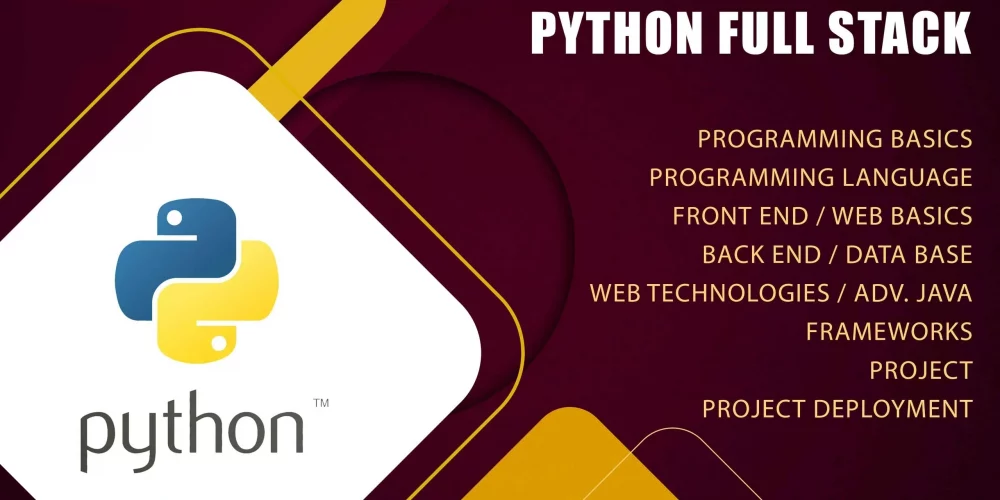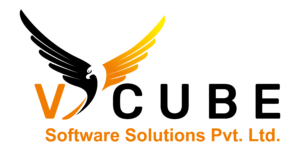PYTHON FULL STACK
PYTHON FULL STACK
A full-stack Python developer knows how to use the Python programming language suite for all types of projects. Python is a general-purpose high-level programming language that may be used to handle both structured and unstructured data.
At vcube software solutions Pvt. Ltd in Kukatpally, Hyderabad, you may learn full-stack Python programming and participate in real-world projects.
Duration: 4months

Python Full Stack Course in JNTU
Course's Key Highlights
![]() 100+ hours of learning
100+ hours of learning![]() Real-time industry professionals curate the course.
Real-time industry professionals curate the course.
![]() Internships and live projects
Internships and live projects
![]() A cutting-edge training facility
A cutting-edge training facility
![]() Dedicated staff of placement experts
Dedicated staff of placement experts
![]() Placement is guaranteed 100 percent Assistance
Placement is guaranteed 100 percent Assistance
![]() 28+ Skills That Are Useful in the Workplace
28+ Skills That Are Useful in the Workplace
![]() Trainers with a minimum of 12 years of experience
Trainers with a minimum of 12 years of experience
![]() Videos and back-up classes
Videos and back-up classes
![]() Subject Matter Experts Deliver Guest Lectures
Subject Matter Experts Deliver Guest Lectures
Contact Us
Why full stack python is so popular
Welcome to the Python and Django Full Stack Web Developer V Cube! In this Course We Cover Everything you need to know to build a website using Python, Django, and many more Web technologies!
Python: It would be used to process the user request in background.
Django: It is the web framework which coordinates all these components to make a web application.
MySQL: It is the open-source database to store the data permanently for long time.
HTML CSS: It would be use to prepare beautiful webpages with numerous styles.
Java Script: It is a client -side scripting language, which would be used to perform client -side validations
GIT: It is the repository to maintain the versions of your source code.
Curriculum for the Full stack python
Python Full Stack Training in JNTU
1. Introduction to programing
1. Learn about the course
1. Setup your computer for the course!
1. Tokens
2. Formatted Strings
3. Operators
⇒Athematic
⇒Logical
⇒Comparison
⇒Identity
⇒Membership
⇒Bitwise
⇒Short-Circuit Evolution
4. Data types
5. Conditional flow Statements
6. Loops
⇒While
⇒While – else
⇒For
⇒For – else
⇒Nested loops
⇒Iterables
10. Inbuilt Data Structures
⇒List
⇒Tuple
⇒Set
⇒Dictionary
⇒List comprehension
⇒Dictionary Comprehension
⇒Unpacking Operator
11.Strings
12. Functions
⇒Defining functions
⇒Arguments
⇒Types of Functions
⇒Key word arguments
⇒Default Arguments
⇒Nested Functions
⇒List of args(*args)
⇒Dictionary of args(**kwargs)
⇒Lambda
⇒Generators
⇒Decorators
⇒Recursive
⇒Map
⇒Filter
⇒Zip
⇒Enumerate
13. File I/O
14.scope
OOP’S
15. OOPs Vs Procedure Oriented programming
16. Oops concepts
⇒Class
⇒Object
⇒Inheritance
⇒Polymorphism
⇒Abstraction
⇒Encapsulation
17. Constructor
18. Class Vs Instance attributes
19. Class Vs Instance methods
20. Static methods
21. Magic methods
22. Destructor
23. Data hiding
24. Operator Overloading
25. Method Overriding
26. Abstract Base Class
27. MRO
28.Exception Handling
⇒Exceptions
⇒Handling Exceptions
⇒Custom Exceptions
⇒With Statement
⇒Raising Exceptions
29. Modules
⇒Creating modules
⇒Compiled python files
⇒Packages
⇒Sub package ⇒ Dir function
1. Regular expressions
2. OS
3. SYS
4. MySql.Connector
5. Threading
6. PDB
7. Random
8. Logging
9. Unittest
1. NumPy
2. Pandas
3. Matplotlib
1. Introduction
2. Setup development environment
3 Getting started with Django
4. Creating an application.
5. Views layer
6. URL mapping
7. Template layer
8.MVT Architecture
9.Http methods
10. Models
⇒Creating migrations
⇒Running migrations
11.MySQL
⇒Connecting to MySQL
⇒Using MySQL in Django
⇒Basic MySQL commands
12.Model Inheritance
13.ORM
⇒Django ORM
⇒QuerySets
⇒Retrieving objects
⇒Filtering Objects
⇒Q Objects
⇒F Objects
⇒Aggregating Objects
⇒Annotating Objects
⇒Grouping Data
⇒Creating Objects
⇒Updating Objects
⇒Deleting Objects
⇒Transactions
⇒Executing Raw SQL Queries
14. Debugging Toolbar
15. Django Template Language (DTL)
Template inheritance
16. Form processing
⇒Django forms
⇒Model forms
17. Cookies handling
18.Image Processing
19. Django Admin
⇒Setting Up Admin Site
⇒Registering modules
⇒Customizing list page
⇒Adding filtering to the ⇒list page
20. Django REST ⇒Framework
⇒Installing Rest ⇒Framework
⇒Creating API Views
⇒Creating Sterilizers
⇒Serializing objects
⇒Deserializing objects
21. Authentication & Authorization
22. Static files
23.Pagination
24.Signals
25.Dynamic URL’s
26.Fuction Based Views vs Class Based Views
⇒HTML
⇒Advanced HTML
⇒CSS
⇒Java Script
⇒Bootstrap
⇒GIT
- 1. Create a fully functional web site using the Full-Stack with Django
2. Learn how to use HTML to create website content
3. Use CSS to create beautifully styled sites
4. Use JavaScript to interact with sites on the Front-End
5. Learn how to take advantage of Bootstrap to quickly style sites
6. Understand HTTP requests
7. Learn the power of Python to code out your web application
8. Implement a full Models-Views-Templates structure for your site - 9 .Mainly interview Skills.
1. Complete Beginners
2. Professionals looking to bridge gaps in their knowledge
MySQL Database
1.Importance of Database
2.DDL
Create
Alter
Drop
Truncate
3.DML
Insert
Update
Delete
4.TCL
Commit
rollback
5.DCL
Grant
Revoke
6.DQL
Select
7.Constraints
Primary key
Unique
Check
Not null
Foreign Key
8.Clauses
9.Operators
10.Single Row Functions
11.Group Functions
12.Joins
13.Functions
14.Stored Procedures
15.Triggers
1.HTML
2.CSS
3.Java Script
4.Bootstrap Templates
Toggle Content
Toggle Content
Toggle Content
Toggle Content
Toggle Content
Toggle Content
Upskill & Reskill For Your Future With Our Software Courses
Python Full Stack Developer Course In JNTU

Quick Links
- Home
- About Us
- Courses
- Contact Us
Other Pages
Contact Info
- 2nd Floor Above Raymond’s Clothing Store KPHB, Phase-1, Kukatpally, Hyderabad
- +91 7675070124, +91 9059456742
- contact@vcubegroup.com

